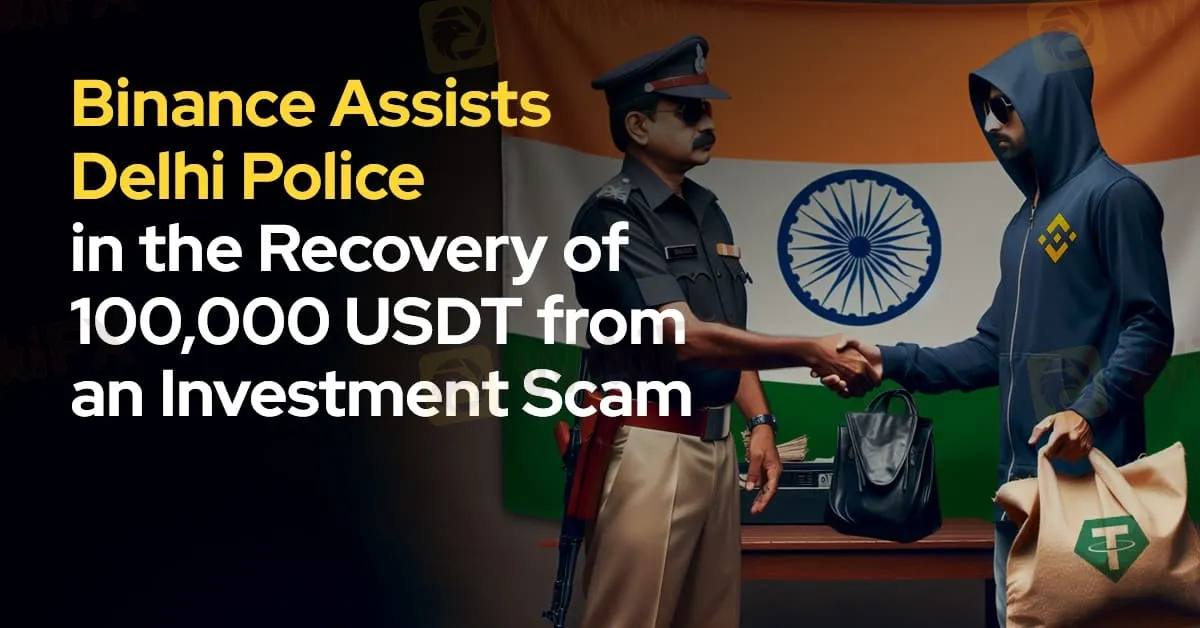简体中文
繁體中文
English
Pусский
日本語
ภาษาไทย
Tiếng Việt
Bahasa Indonesia
Español
हिन्दी
Filippiiniläinen
Français
Deutsch
Português
Türkçe
한국어
العربية
Binance Assists Delhi Police in the Recovery of 100,000 USDT from an Investment Scam
Abstract:The Delhi Police, in collaboration with cryptocurrency exchange Binance, successfully dismantled a large-scale renewable energy scam orchestrated by M/s Goldcoat Solar. The operation led to multiple arrests and the recovery of over 100,000 USDT in digital assets.

The Delhi Police, in collaboration with cryptocurrency exchange Binance, successfully dismantled a large-scale renewable energy scam orchestrated by M/s Goldcoat Solar. This fraudulent entity deceived numerous investors by falsely claiming government backing and promising high returns from investments in solar power projects. The operation led to multiple arrests and the recovery of over 100,000 USDT in digital assets.

M/s Goldcoat Solar positioned itself as a key player in Indias renewable energy sector, falsely claiming to contribute to the country's goal of achieving 450 gigawatts of solar capacity by 2030. Through aggressive social media campaigns, the group fabricated endorsements from high-ranking officials and presented fake investment returns to gain credibility and attract unsuspecting investors.
The investigation revealed that the scam was facilitated through multiple SIM cards registered with stolen identities, many of which were circulated internationally. These methods allowed the syndicate to operate across borders and evade detection. A significant portion of the defrauded funds was laundered through a series of bank accounts before being converted into cryptocurrency, further complicating efforts to trace the stolen money.
To navigate the complexities of the financial web, the Delhi Police enlisted the help of Binance. Through a series of virtual meetings, Binance provided advanced analytical tools and insights, enabling investigators to track the movement of digital assets. This collaboration proved crucial in identifying the perpetrators and tracing the stolen funds.
Binance‘s involvement underscored the importance of cooperation between public and private entities in tackling financial crime. The company’s law enforcement training head noted that working closely with agencies like the Delhi Police allows digital asset exchanges to provide timely support in combating fraudulent activities and protecting individuals from financial scams.

Disclaimer:
The views in this article only represent the author's personal views, and do not constitute investment advice on this platform. This platform does not guarantee the accuracy, completeness and timeliness of the information in the article, and will not be liable for any loss caused by the use of or reliance on the information in the article.
Read more

Bybit Shuts Down NFT Marketplace Amid Crypto Market Downturn
Bybit announces the closure of its NFT marketplace, citing efforts to streamline offerings. Discover the latest trends in the declining NFT market and its shift to utility-based growth.

Galaxy Digital Settles $200M in Luna Token Manipulation Case
Galaxy Digital pays $200M to settle Luna token manipulation probe by NY regulators, linked to TerraUSD’s 2022 crash, impacting crypto market stability.

Vanuatu Passes VASP Act to Regulate Crypto and Digital Assets
Vanuatu's new VASP Act regulates crypto businesses, enforcing strict licensing, AML/CFT compliance, and investor protections.

Blockchain Decentralization: Empowering a Trustless Future
In recent years, blockchain technology has rapidly evolved from a niche innovation behind Bitcoin into a transformative force across industries. At its core, blockchain decentralization refers to the distribution of authority and decision-making away from a central entity and into the hands of a distributed network of participants. This shift redefines how data is stored and verified and paves the way for trustless, transparent, and resilient systems that challenge traditional centralized models.
WikiFX Broker
Latest News
Interactive Brokers Launches Forecast Contracts in Canada for Market Predictions
Authorities Alert: MAS Impersonation Scam Hits Singapore
INFINOX Partners with Acelerador Racing for Porsche Cup Brazil 2025
The Impact of Interest Rate Decisions on the Forex Market
Billboard Warns of Crypto Scams Using Its Name – Stay Alert!
STARTRADER Spreads Kindness Through Ramadan Campaign
How a Housewife Lost RM288,235 in a Facebook Investment Scam
Rising WhatsApp Scams Highlight Need for Stronger User Protections
A Trader’s Worst Mistake: Overlooking Broker Reviews Could Cost You Everything
The Daily Habits of a Profitable Trader
Currency Calculator







